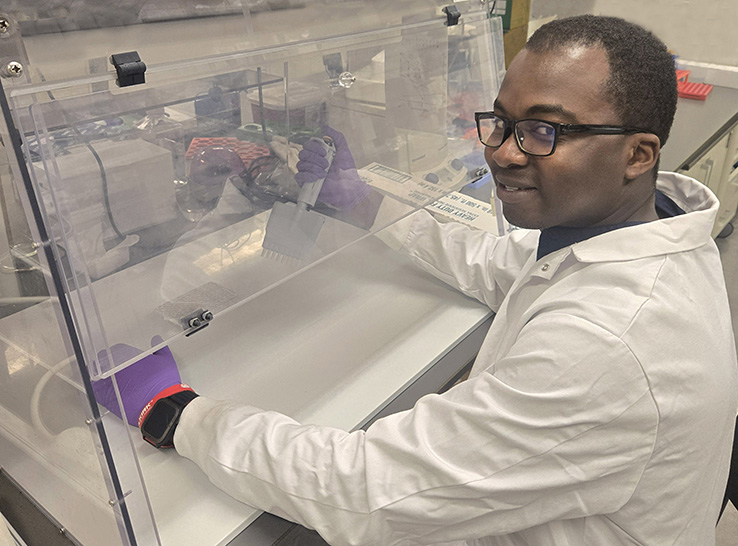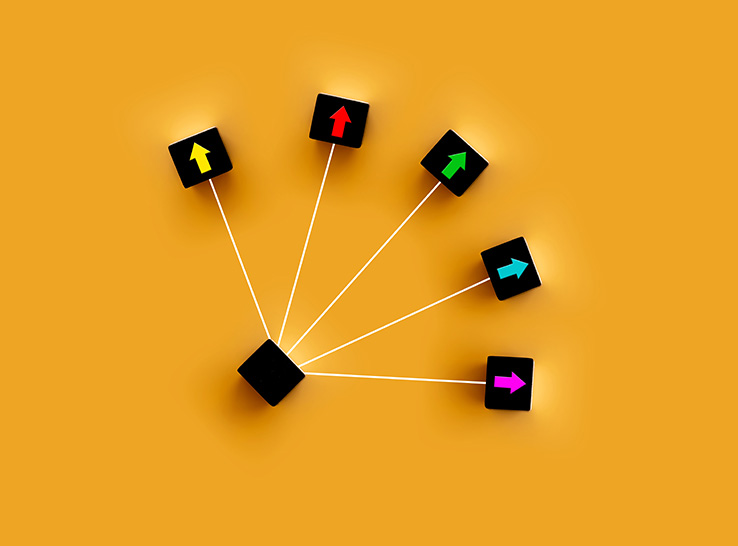By Emmanuel Alagbe, MS
PhD Candidate
Graduate Research and Teaching Assistant
Purdue University, West Lafayette, Indiana
Coccidiosis is a parasitic disease caused by Eimeria species in poultry. It is responsible for an estimated $13 billion in annual losses worldwide.1 This disease negatively impacts the intestinal health of broiler chickens, reducing growth performance and muscle accretion.
In response, the poultry industry is increasingly exploring natural feed additives to combat coccidiosis. These additives aim to improve performance, increase nutrient absorption and improve overall health.
What is spirulina?
Spirulina, a nutrient-dense blue-green algae, has drawn particular interest as a feed additive. Humans have used it as a concentrated food and medicine-like supplement for decades, valued for its high protein content and rich blend of bioactive compounds. In humans, spirulina has also been shown to improve iron absorption and alleviate certain inflammatory symptoms, such as allergic rhinitis.2
This algae contains essential and non-essential amino acids, phycocyanin, polysaccharides, beta-carotenes, omega-6 fatty acids and phenolic compounds, as well as minerals such as iron, magnesium, zinc and selenium. Spirulina also contains vitamins A, E and several B vitamins, further adding to its nutritional profile.3
Spirulina’s reputation as an antioxidant and anti-inflammatory supplement has encouraged researchers to test its potential as a feed additive in poultry diets. However, its inclusion level or effectiveness in animal challenge models is largely unclear. As feed costs rise and pressure mounts to reduce antibiotic use, industry stakeholders are looking closely to see whether spirulina could become a reliable feed additive to improve broiler chicken health and profitability.
Study design
When we set out to test whether dietary spirulina could help broiler chickens cope with an Eimeria infection, our goal was straightforward: to determine whether a modest inclusion of spirulina (5 g/kg feed) would influence growth performance, nutrient utilization, intestinal morphology, antioxidant status and select immune and barrier markers following a coccidiosis challenge.4
We used 384 Cobb 500 male broilers in a 26-day trial with four treatments, each replicated eight times. The treatments were:
- 0 g/kg spirulina + no Eimeria challenge
- 5 g/kg spirulina + no Eimeria challenge
- 0 g/kg spirulina + Eimeria challenge
- 5 g/kg spirulina + Eimeria challenge
Birds were challenged with Eimeria on day 15, and we monitored growth performance throughout. To capture the effects of both diet and infection, samples were collected at 6 and 11 days post-infection. These samples were used for histology, serum biochemistry and gene-expression assays to provide a broad view of intestinal health, immune response and metabolic changes.
Performance, nutritional benefits
Our trial results demonstrated that broiler chickens fed spirulina grew slightly better than those without it. Supplementing the diet with 5 g/kg spirulina increased bodyweight gain and improved feed efficiency (gain-to-feed ratio). These improvements appeared early, between days 14 and 21, and continued through the 14- to 26-day period.
As expected, the Eimeria challenge reduced growth, feed intake and feed efficiency. However, birds on the spirulina diet appeared to recover more quickly.
Spirulina also improved specific measures of nutrient retention. On day 6 after challenge, nitrogen digestibility was higher in spirulina-fed birds, with the strongest effects seen in healthy, no-challenge birds. By day 11, benefits in challenged birds were less consistent. These findings suggest that spirulina can support growth and nutrient utilization under normal conditions and may provide partial protection during coccidiosis infection. However, it does not fully offset the disease’s adverse effects.
Effect on intestines, biochemistry
One of the most striking findings of our study was the effect of spirulina on the intestinal structure of broiler chickens. Birds fed spirulina showed larger ileal villus perimeter and area, particularly at 6 days post-infection. In contrast, the Eimeria challenge produced the classic signs of intestinal damage: deeper crypts and a reduced villus-height-to-crypt-depth ratio.
By 11 days post-infection, spirulina-fed birds continued to display a larger villus perimeter, a change that implies greater absorptive capacity and likely contributed to the improved nutrient uptake observed in these birds.
Biochemical measures told a similar story. Spirulina consistently enhanced antioxidant defenses. Birds receiving spirulina had higher serum catalase activity and a greater total antioxidant capacity at 11 days post-infection. These systemic changes aligned with increased expression of antioxidant-related genes in the jejunum, suggesting spirulina stimulates both local and whole-body antioxidant responses. Because coccidial infections are known to elevate oxidative stress, this boost in antioxidant capacity may be an important mechanism by which spirulina supports the recovery of birds.
Trial caveats
At the same time, it is important to clarify what spirulina did not do. The supplement did not fully reverse the growth loss or intestinal damage caused by Eimeria. Some measures of digestibility and tissue health showed only partial improvement, and infection-driven changes remained evident in spirulina-fed birds. Furthermore, this study tested a single inclusion level (5 g/kg) under a controlled challenge. Different inclusion levels, field conditions or vaccination status need to be explored.
Concluding thoughts
In conclusion, our study illustrates that including spirulina at 5 g/kg into broiler diets offers measurable benefits. Birds fed spirulina demonstrated better early growth and feed efficiency, enhanced antioxidant capacity and gene expression, and modest improvements in intestinal morphology. Spirulina also reduced oocyst shedding following Eimeria infection. Importantly, these effects were supportive rather than curative. Spirulina improved resilience and health but did not fully reverse growth losses or intestinal damage caused by coccidiosis.
What does this mean for farmers and producers? Spirulina may serve as a valuable complementary feed additive for broiler chickens. It can help birds better withstand infection and recover more quickly, and may be combined with established coccidiosis-control strategies, such as vaccines and anticoccidials.
References
1 Blake DP, Knox J, Dehaeck B, Huntington B, Rathinam T, Ravipati V, Ayoade S, Gilbert W, Adebambo AO, Jatau ID, Raman M, Parker D, Rushton J, Tomley FM. Re-calculating the cost of coccidiosis in chickens. Vet Res. 2020 Sep 14;51(1):115. doi: 10.1186/s13567-020-00837-2.
2 Karkos PD, Leong SC, Karkos CD, Sivaji N, Assimakopoulos DA. Spirulina in clinical practice: evidence-based human applications. Evid Based Complement Alternat Med. 2011;2011:531053. doi: 10.1093/ecam/nen058.
3 Spínola MP, Mendes AR, Prates JAM. Chemical Composition, Bioactivities, and Applications of Spirulina (Limnospira platensis) in Food, Feed, and Medicine. Foods. 2024 Nov 17;13(22):3656. doi: 10.3390/foods13223656.
4 Alagbe EO, Schulze H, Adeola O. Dietary Spirulina effects in Eimeria-challenged broiler chickens: growth performance, nutrient digestibility, intestinal morphology, serum biomarkers, and gene expression. J Anim Sci. 2024 Jan 3;102:skae186. doi: 10.1093/jas/skae186.







